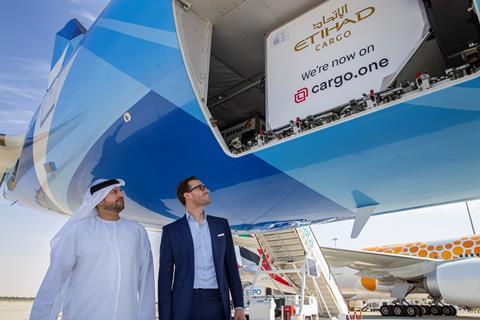
Etihad Cargo has continued to digitise its offering by becoming the latest carrier to sign up to the cargo.one booking platform.
Starting this week, freight forwarders will be able to instantly book cargo space on Etihad’s aircraft through the digital platform.
Etihad Aviation Group’s managing director cargo and logistics services Abdulla Mohamed Shadid told Air Cargo News this is the latest step in the cargo carrier’s digital development, which it started just over one year ago when it went live with the IBS iCargo system.
“As we have navigated the last 12 months, the journey has been quite remarkable and our customers’ keenness to move to online booking has been beyond our expectations,” he said.
“Today, about 38% of bookings are coming through our online portal and that number continues to increase - it shows the cargo industry's hunger and drive to adopt digital technologies, which I think has been historically lagging in the sector.”
Shadid added that putting capacity on cargo.one would provide existing customers with more booking options but could also help win new customers in markets it hasn’t tapped into in the past.
Moritz Claussen, managing director of cargo.one, added that implementation work had started in September and had taken around six weeks to complete, helped by the fact that cargo.one has worked with other airlines on the IBS iCargo system.
Claussen added that Etihad Cargo is not the first Middle East-based carrier to put its capacity on cargo.one, but the addition will help expand the number of origins and destinations that forwarders using the platform are able to access because of the number of connection the airline offers from Abu Dhabi.
“In total we are adding 30-35 additional destinations around the world with Etihad Cargo joining,” said Claussen.
“So, we are gaining quite a lot out of the addition of Etihad Cargo’s network and we will be able to offer a lot more to forwarders using cargo.one.”
In total, cargo.one now has eight airlines signed up to the portal – it also recently announced Nippon Cargo Airlines – as well as 320 freight forwarder companies, although they often have many branch offices making bookings.
He added that the number of users on cargo.one has been growing on average by 20% each month and volumes are up significantly, despite the market downturn.
Looking to why digital services are quickly growing, Shadid said it is part of the industry’s drive to improve the ease of doing business.
“Historically the industry relied on email exchanges and telephone calls and that provided very little visibility for a forwarder into available capacity and available pricing in the marketplace.
“Maybe 70% of the industry probably still operates like this today, but these digital systems allow forwarders to speed up the access to information - visibility on capacity, routing and prices - and at the click of button have your transaction and shipment confirmed on a flight.”
He added that this does not mean the elimination of the human element of the air cargo business. Instead, it will allow companies to focus on customer engagement at a strategic level rather than on a transactional basis.
Claussen added: “The air cargo industry spends a lot of time and resource facilitating transactions, which yield very little advantage to either party on both sides. Taking those resources and freeing them up to be able to actually do what the customer wants us to do and to have a great experience is exactly what we are trying to do here.
“There is also perhaps a smaller point to that - people are now used to doing things digitally, so there is no reason why as soon as a freight forwarder enters the office they go back 25 years in time and everything revolves around paper, emails and phone calls.”
Looking to the future, Shadid said that Etihad Cargo has plans to continue its digital drive and added that is has an “ambitious investment programme over the next 24 months”.
He said: “Our new technology platform gives us the ability to rapidly build API connectivity to seamlessly link with other platforms so I think cargo.one will be the first non-Etihad Cargo platform that we will link with but there will be a couple of others that will follow suit.”
The ability to connect via APIs also means Etihad Cargo can build direct links with customers’ systems, while dynamic pricing and quote-to-book modules are also on the horizon.
“This is part of a wider strategy of taking our customers from the transactional era and moving them to the experience era with Etihad Cargo,” Shadid said.
“That means not only will we continue to invest in an upgraded EtihadCargo.com, in addition to the API connections with cargo.one others, but we will also extend that digitalisation to other areas of the business, such as our cargo terminal operations and handling businesses.”















